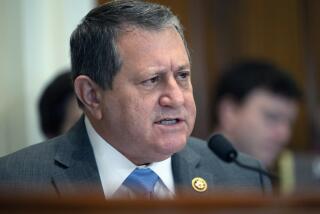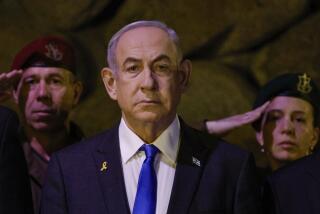U.S. Does a Balancing Act on Immunity
- Share via
UNITED NATIONS — In its battle to shield U.S. peacekeepers from a new international court, the Bush administration may have to win by losing--or at least by appearing to retreat a bit--so that key European allies here can ultimately deliver a compromise.
Yet the administration must reassure foes of the International Criminal Court in Congress and the Pentagon that the U.S. is not backing down from its core demand: that American peacekeepers be guaranteed immunity from prosecution before the tribunal.
To the consternation of the court’s staunchest backers, it appeared Thursday that U.S. diplomats may yet pull off this balancing act, as a still-divided Security Council edged closer to putting American soldiers and officials beyond the court’s reach.
Throughout the day, council members debated an American proposal portrayed by Britain and a few others as a significant compromise, but rejected by court supporters as an unacceptable--and possibly illegal--infringement of the tribunal’s authority.
American diplomats said they hoped for a vote on the measure today, an indication of confidence that they can get the required nine-member majority on the 15-nation council.
Informal head counts by European sources showed six members still strongly opposed to the U.S. proposal, six inclined to support it--including four of the five permanent members--and three wavering in between.
A week ago, only China appeared ready to back Washington.
The self-imposed deadline for council action is midnight Monday, when a U.N. mandate for two peacekeeping missions in Bosnia-Herzegovina is set to expire.
The administration’s new resolution, like its previous proposals, would preemptively keep the new court from investigating or prosecuting present, former or future U.S. participants in U.N.-backed peacekeeping missions. In a change from the last American proposal, however, the exemption would be in force for 12 months, instead of being automatically and perpetually renewed.
The apparent concession was hailed by Jeremy Greenstock, Britain’s ambassador to the U.N., “as a positive basis for compromise.”
However, the Security Council could and should annually renew the 12-month exemption “for as long as may be necessary,” states the U.S. draft--not a great distinction from past proposals, critics say.
In Washington, administration officials rejected suggestions that the United States was succumbing to European pressure to compromise, saying little of substance has changed between the new U.S. proposal and earlier draft resolutions. The American proposal would apply to all nations that have not signed the treaty that created the court, including the U.S.
The latest text is “fully consistent with our need to protect U.S. forces and other forces from non-signatory countries,” said Sean McCormack, a National Security Council spokesman. “This idea that somehow there was a reversal really couldn’t be further from the truth.”
At the United Nations, however, U.S. diplomats were conspicuously avoiding any similarly direct rebuttals of European colleagues who privately characterized the U.S. position as a retreat.
The revision allows Britain and other backers of the court who are seeking to end the impasse to claim that they have foiled the original U.S. demands for an upfront guarantee of immunity in perpetuity.
In council debates, the U.S. position has received some support from India and China, while more marginal players--such as Bulgaria, Singapore and Cameroon--preached the virtue of compromise. But most council members, along with two dozen other nations that addressed the body on the issue Wednesday, have challenged the U.S. assertion that its peacekeepers are at risk of politically motivated or capricious prosecution by the court.
That dismissive stance infuriates many U.S. officials and politicians, who say U.S. troops should not be bound by a treaty the U.S. has not ratified.
“I find it bizarre that some countries appear to be more interested in exercising criminal jurisdiction over Americans than they are in enhancing the effectiveness of United Nations peacekeeping efforts around the world,” Rep. Henry J. Hyde (R-Ill.), chairman of the House International Relations Committee, said last week.
Congressional ire notwithstanding, some diplomats have questioned whether Washington would veto all peacekeeping missions, as it has threatened to do unless and until the council adopts the special protections it is seeking.
Jean-David Levitte, the French ambassador to the U.N., noted that the U.S. has long supported the world body’s peacekeeping efforts in trouble spots where America was not prepared to station its own troops, such as the U.N. mission along the Lebanese border, which comes up for renewal later this month.
“Nobody questions the major responsibilities shouldered by the United States, including military responsibilities, but there are many crises where the U.S. does not want to be directly involved,” Levitte told the council Wednesday. “There is one solution for these situations: the blue helmets” of the United Nations.
While U.N. Secretary-General Kofi Annan told the council this week that he considered war-crimes prosecutions of peacekeepers “highly improbable,” human rights groups note that U.N.-backed forces in Africa and the Balkans have been accused of atrocities.
“In seeking to win immunity for its own peacekeepers, the U.S. could allow peacekeepers such as those from countries with ineffective legal systems to get away with murder,” the Lawyers Committee for Human Rights said in a statement Thursday opposing the U.S. proposal.
Some strong supporters of the court suggest that the Pentagon is right to worry that even U.S. forces under a U.N. mandate could be exposed to court action. Among the war crimes potentially punishable by the new court are military actions that are judged to have targeted noncombatant civilians, a category that Amnesty International has said could apply to attacks such as the NATO bombardment of a state television studio in Belgrade during the 1999 war in Yugoslavia, which killed 16 people.
Like its predecessors, the new U.S. resolution would in effect amend the treaty establishing the court, critics say, exceeding what they contend are the council’s powers under the U.N. Charter.
“You cannot amend a treaty through the Security Council, or otherwise the Security Council becomes the government of the world,” said David Donat-Cattin, a legal advisor to parliaments seeking to ratify the court treaty.
On Thursday, France offered its own resolution. Instead of granting a blanket exemption to U.S. troops, the French would ask the court to advise the council of any contemplated action against U.N. peacekeepers. The council could then exercise its treaty-given right to halt the investigation or prosecution for up to 12 months.
The French draft, however, does not satisfy U.S. demands for guaranteed immunity from the court.
French Foreign Minister Dominique de Villepin met with Secretary of State Colin L. Powell in Washington on Thursday to see if there might be some way of melding the French and American proposals.
“We would quite clearly go with anything that the United States and France could sort out between them,” said Greenstock, the British ambassador.
*
Times staff writer Edwin Chen in Washington contributed to this report.
More to Read
Sign up for Essential California
The most important California stories and recommendations in your inbox every morning.
You may occasionally receive promotional content from the Los Angeles Times.












